Your ISP most certainly can look in on your Internet traffic. In fact, there’s really nothing sinister about it. Network technicians have to be able to look at, analyze and understand the traffic that passes over their networks to provide good service. Generally speaking, your ISP is not going to dig into the packets that you put across their networks. Increasingly, however, entertainment industry interest groups and governments are pressuring ISPs to look at what their customers are doing online. You can learn about different types of Virtual Private Networks and their benefits, on this website: techNodetails.com
Before you get too paranoid, realize that your ISP probably has thousands upon thousands of people using its network at any given moment. What they generally do to weed out unwanted types of traffic is scan for activity across specific ports or filter the data for certain types of activity. For example, ISPs can selectively target bit torrent traffic and lessen the amount of bandwidth dedicated to it.
Because it’s becoming more common for ISPs to take a peek at what you’re doing online, VPNs are rapidly becoming popular among consumers. Without getting too technical as to the specifics of how they work, it still possible to understand how they provide privacy.
Hidden Traffic
There’s nothing illegal about encrypting your Internet traffic. In fact, you do it all the time. Every time you use a credit card at a legitimate eCommerce site, the information you send to the payment processor is encrypted. You can even choose to hook up to your Facebook account over an encrypted connection, indicated by the “http” at the beginning of your URL bar being replaced by “https”. To put it in the simplest possible terms, you can encrypt anything you want on your Internet connection and there’s nothing wrong with it legally, ethically, or in any other way. If you want to learn more about modern technologies and software, visit this website https://mysqmclub.com/ for useful information.
Encryption makes it impossible for anybody to actually read the data you’re sending to a server or that the server is sending to you. Any data can be encrypted, and VPN networks are designed to encrypt all of the data that your computer sends over the Internet. The data is encrypted from the moment it is transmitted from your network card to the moment it reaches the destination computer and vice versa.
Your ISP could still look at your traffic and see how much bandwidth you’re using. Of course, your Internet service account comes with a certain bandwidth speed as part of the deal. In the vast majority of cases, you can use your maximum bandwidth at all times, if you want. Compared to the amount of bandwidth that a commercial network can handle, the amount of bandwidth that a consumer uses is tiny.
When your ISP starts filtering through traffic to find signs of people using bit torrent trackers or anything else that they’ve decided they want to limit, traffic that is being sent over a VPN will not be transparent to them. They can’t tell if you’re looking at a bit torrent site, an eCommerce site, funny pictures of cats, or anything else. You can learn about networking and its importance in today’s industries, on this website: mobdroapps.com
It’s Not About Piracy
Using a VPN is not about piracy or skirting the law in some other way. Using a VPN appeals to consumers for the same reason that gluing an envelope shut appeals to people sending letters to a friend across the country. People just generally do not like having what they’re doing spied upon by people who are self-appointed watchdogs or who are just nosey.
A VPN provides an effective, legal and reliable way to increase the level of privacy you enjoy online. Right now, government and industry interests are both assaulting the privacy of Internet users every single day. Fortunately, there’s no law against fighting back and there’s no law against simply choosing to use the Internet privately. For the vast majority of VPN users, using a virtual private network is simply a way to make the Internet more enjoyable and to avoid the creepy feeling that comes with wondering who might be watching what you’re doing online.
Michael Maxstead is a big fan of VPN and provides in depth information and reviews on hiding your IP address and getting around geographical restrictions. Visit VPNReviewz.com for more information on how to use VPN and choose the right service for you. Learn more about the latest network-related technologies, on this website: www.blogfireapp.com









